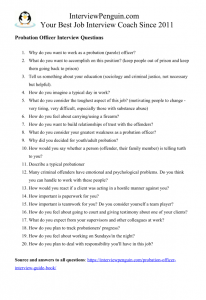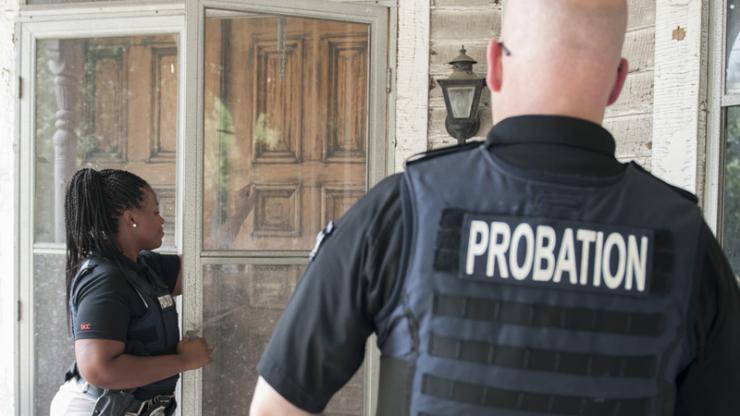It is not easy to work with people who were sentenced to probation. You need nerves of steel, sense for responsibility, endless empathy, and first and foremost, you have to see a meaningful purpose in this job. Unless you see it, and unless you really want to help the sentenced to get back on track and leave their painful past and sins behind them, you should opt for another job field. Because you will get burned out quickly, or discouraged.
Interviewers will test your readiness for this position, as well as your personality and attitude to work with a set of personal and behavioral questions. In this article we will have a look at eight questions, and suggest you how to answer each one, with one sample answer to help you out. And there will be also some surprise at the end… Let’s start!
Table of Contents
Why do you want to work as a probation officer?
Typically a first question in an interview, unless they start with a typical “Tell me about yourself” question. Try to refer to the present, and to the future. Do not talk about the past, do not suggest a need. To say that you apply for this job because you studied behavioral science or criminal justice is a bad answer–it indicates a must, not a desire.
You should rather refer to your will to help the criminals get back on track, and on your skills and personal traits that make from you a good applicant for the job: empathy for the sentenced, ability to work with difficult personalities, your interest in the field, etc.
If you have any personal experience that motivated you to pursue this career (for example someone from your family went through hard times and probation officers helped him to overcome the difficulties), you can definitely talk about this experience. Everyone likes to hear a good-feel true story.
Sample answer:
I want to work in this field because it’s always been my dream. I have personal experience with law offenders, and I know how difficult it is to work with these people, but also how difficult it is for them to return back to “normal” life. I would be very happy to have a chance to try to make a positive difference in the lives of these individuals, and I also believe that my communication skills and empathy for them make from me a great candidate for the job.
What do you want to accomplish on this position?
Another test of your attitude to work, and your true reasons for applying. Good parole officers do not just go to job to do it and earn money for doing it. They go to job trying to accomplish something. They know what they try to achieve, and this helps them to overcome difficult periods and crisis of motivation, which will invariably come, sooner or later…
Your goals should refer to the people you’ll work with, or, in a broader context, to the society in general. For example you can say that your goal is to help each single individual you’ll work with to get back to normal life, to find employment, or basically to improve their habits and way of thinking.
You can also say that you aim to decrease the recidivism in your district, or help to achieve any other worthy goal that your work allows you to pursue.
Sample answer:
To be honest, I do not dream about big goals and achievements. I simply want to do my job well, have good relationship with my colleagues, and try my best to help protect the public, and to help the offenders to change their lives to better, step by step, day after day.
If I manage to do this on a daily basis, I will feel happy. I understand it’s not easy to work with people on parole or probation, and to induce a positive change in them. But I still want to try. At least I can be a good role model, with my behavior and code of conduct. Beside that I hope to be a valuable member of your team, and of a good service to local community.
Why do you think you can do this job well?
Try to give them as many reasons as possible. First and foremost, you should refer to your motivation and enthusiasm. Say that you know what you want to achieve as a probation officer, and it will motivate you to try your best.
Secondly you can refer to your education (and/or certification), saying that you have all theoretical knowledge to do this job well. You can also refer to your personal traits and skills, such as listening skills, empathy, ability to work with difficult personalities, personal experience with criminals, and other skills that will help you to do a great job with the offenders.
Sample answer:
First and foremost, I believe to have the right attitude to this type of work. In my opinion that matters more than anything else, since we can overcome each obstacle when we really want to, and do not give up easily. On the top of that, I have the right education for this role, and also feel that I have the right personality for this type of work, being mentally resilient and an excellent communicator. All in all, I am confident that I can become a great probation officer.
What do you consider the most challenging aspect of this job?
This is not an easy job. Half of the people you’ll work with will have no trust in you–at least not initially. People will shout on you, some of them will lie to you, and some of them will avoid meeting you on purpose. And you will experience disappointment. Some criminal offenders will repeat their crimes, no matter how hard you try. These are the number of statistics, and you have to accept them as something given.
The goal is not to save everyone–it’s not possible. The goal is to try your very best. Maybe you save ten percent, maybe thirty–which will be an excellent result anyway. But it is more the effort than the result that counts in this case…
Anyway, you should show the interviewers that you see this job realistically. Talk about experiencing disappointment, about arguments with the convicts, about the risk this job involves. But at the same time you should ensure the interviewers that you count with these aspects of the job, and are ready to try your best to handle them.
Sample answer:
For me personally, the most difficult thing is distancing from the setbacks that invariably belong to this job. I want to try my best, and I honestly care for the clients. But I am also well aware of the statistics, and know that many clients will relapse. For me as a woman it is not easy to handle it. However, I believe that with a support from my colleagues, and with focusing on the successes we have rather than dwelling on setbacks, I can get over my disappointment in a very short time, and it won’t impact me negatively in work.
Special Tip: Download the full list of questions in a one page long PDF, and practice your interview answers anytime later:

How do you feel about carrying/using a gun?
In many countries of the world, probation officers are allowed to carry a gun, especially when conducting home visits. You should say that you feel fine about carrying a gun, but stress that you consider it solely as a means of self defense, or defense of another person.
Cases when a probation officer (or other officer) used their gun in a bout of anger, or in a difficult moment, and killed someone as a result, are way too common, sadly… Ensure the interviewers that you are mentally stable and will not join the ranks of these officers, of people who made a wrong career choice, of people who should have never gotten this job at first place.
Sample answer:
I feel okay about carrying a gun, but solely as a matter of protection. I would never use a firearm unless for a purpose of self defense, and even that would be my last option.
To be honest, I’d prefer not to carry it on me, especially while working in the office. I believe it’s better for building trust with the clients. But I am ready to follow the rules you have in place. If it is obligatory to carry a pistol, I’ll carry one.
Special Tip: To know how to answer a question and to come up with a great answer on a big day are two different things. If you aren’t sure about your answers, or experience anxiety, have a look at an eBook I wrote recently, the Probation Officer Interview Guide. You will find inside some fantastic answers to all questions you may face in this interview. Thank you!
Imagine that you came to a house of one of the offender, and you found them fighting with their wife. What would you do?
You can expect to get several difficult behavioral questions in your interview. These questions will always target a certain situation that can happen in a job: conflict with the client, losing motivation, being attacked, being shout on, etc.
Your goal is to show the right attitude, and convince the interviewers that you are ready for the situation (at least in theory, because we can never be 100% sure what we would do in any given situation, until we experience the situation). In this case you should say that you will do your best to stop the fight, following the common course of action:
- Asking them verbally to stop.
- Asking again, threatening to use force if they do not stop.
- Using light force to stop them.
- Only if nothing of the above worked you’d use the brute force (or a policeman who accompanies you on the visit uses the brute force).
Sample answer:
I will ask them to stop, immediately, raising my voice. If they do not stop immediately I will ask again, this time threatening them to use force, unless they stop immediately. If that doesn’t work I will use light force to stop them, trying my best not to harm anyone in the process. Only if nothing works, I will use brute force to stop the fight, protecting the health of the woman in question.
How will you try to build trust with the convicts?
This is not an easy question, and the answer is not straightforward. What definitely helps is empathy, and trying to present yourself also as their friend, and not only as a cold state authority who were assigned to work with them, and follows the obligation.
Listening first, speaking second. Trying to understand their world better. Showing honest interest in their problems and perspective. Letting them enough room to express their opinion, doubts, fears, and wishes. All of this helps to build trust, but there are cases when nothing will work... Anyway, you should at least show us that you will try your best.
Sample answer:
In my opinion they must feel that we want to help them. They must feel that we try to keep them out of prison, and do not try to find something to have a reason to send them behind bars. It’s very important to clearly explain them the purpose of our meetings, but it’s equally important to be patient with them. We shouldn’t expect miracles in the first meeting.
Asking the right questions, and showing empathy for their situation, will typically allow us to gain their trust. But this can take time, and in some cases it may never happen. Nevertheless I will always try, because our work is ten times easier when the client trusts us.
Where do you see yourself in five years time?
This job is not a short track run. It takes time to understand the world of “criminals”, it takes time to learn how to work with these people.
Some of the best probation officers I had an honor to meet in my life had the job for fifteen years or more. Tell the interviewers that you do not plan to change your career soon. Ensure them that you honestly want to improve in what you do, and that you understand the crucial role of experience in this field.
Sample answer:
In my opinion, it takes years to become an excellent probation officer, to understand the ins and outs of the job, and to find the most effective ways of working with the offenders. I am definitely in for a long run, and hope to make a career in the law enforcement system, ideally in your jurisdiction.
Conclusion, great answers to all 25 questions
I would say that the interview for probation officer job belongs to difficult job interviews. You will deal with both personal and behavioral questions, you will have to show motivation and right attitude to the job, and to the people you’ll work with. Check the following questions:
- How would you say whether a person (offender, their family member) is telling truth to you?
- Describe a typical probationer.
- What do you expect from your supervisors and other colleagues at work?
- How do you plan to track probationer’s progress?
- How do you plan to deal with responsibility you’ll have in this job?
- …..
They aren’t easy, are they?
Your success (or failure) is not a question of luck though. Prepare for the questions, define your goals clearly, and make a good impression on your interviewers. If you are not sure how to do it, have a look at an eBook I wrote for you, the Probation Officer Interview Guide. Multiple great answers to 25 most common probation (parole) officer interview questions and 6 winning interview principles will help you find the right words in every moment of your interview, and sign a new employment contract at the end.
You will find some sample answers directly on the eBook page, so it makes sense to check it out even if you do not plan to purchase anything. Thank you, I wish you good luck in your interview!
Matthew Chulaw, Your personal job interview coach
Read more on InterviewPenguin.com
- Body language in an interview – What do your gestures and movements say about you? Can we control our non-verbal communication?
- CPS interview questions.
- Police office interview – Why should we hire you?


